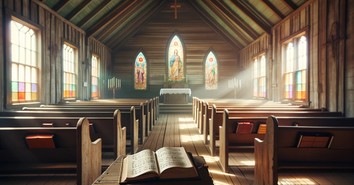Trump, Voodoo, and the Missing Piece in Today's Debate on Morality
In his debate with Kamala Harris last week, former President Donald Trump stated that Haitian immigrants in Springfield, Ohio, were abducting and eating pets. The comment provoked a furor that continues unabated this morning. It’s easy to find opinions siding with Mr. Trump or against him and focusing on immigration as a threat or a benefit to America.
Are All Religions “a Path to Arrive at God”?
Here’s what’s harder to do: Find objective reporting about the religious context behind the controversy. After some effort, here’s what I was able to discover online:
- A 2004 National Geographic article states that voodoo is the “dominant religion” in Haiti.
- A 2011 article explaining voodoo reports that “food is one of the many offerings ceremoniously given to the Lwa (Spirits) and is usually shared afterward as a communal meal.”
- An article opposing animal abuse notes that “animal sacrifice” in voodoo is “a central part of this faith,” while a 2013 report claims that animal sacrifice “isn’t embraced by all” practitioners.
To be clear: Reports that some voodoo adherents employ animal sacrifices does not mean Haitian immigrants in Ohio are doing so. My purpose is not to take sides in the partisan conflict over Mr. Trump’s comments. Rather, it is to ask why the religious worldview that should be vital to the debate is largely absent from the discussion.
In other news, Pope Francis made headlines with his statement that both Donald Trump and Kamala Harris are “against life.” He added that American Catholics must choose the “lesser of two evils” because of Mr. Trump’s position on immigrants and Ms. Harris’s support for abortion.
Now consider another statement by the pope: In Singapore, he declared, “All religions are a path to arrive at God.” He added, “They are like different languages to arrive there. But God is God for all.” With all due respect to the pontiff, this claim contradicts clear, historic Christian orthodoxy regarding the necessity of faith in Christ. (I plan to address this fact in tomorrow’s Daily Article.) But it is receiving far less coverage than his statement regarding the American presidential election.
Why is this?
“Self-Evident” or “Sacred and Undeniable”?
Most of us can recite Thomas Jefferson’s famous statement in the Declaration of Independence: “We hold these truths to be self-evident, that all men are created equal, that they are endowed by their Creator with certain unalienable Rights, that among these are Life, Liberty, and the pursuit of Happiness.” However, in reading David M. Rubenstein’s The Highest Calling: Conversations on the American Presidency over the weekend, I discovered a fascinating fact: Mr. Jefferson actually wrote the words “sacred and undeniable,” but Benjamin Franklin substituted “self-evident” in their place.
As a result, our founding creed embraces “truths” that are “evident” to the “self” rather than “sacred” and thus “undeniable.” Here, we see the early seeds of what became the postmodern rejection of objective truth based on biblical revelation. In its place, we privilege materialism and scientific secularism as “factual” and view objective morality and religion as subjective speculation. And we give far less cultural attention to the latter than to the former.
Why does this rejection of objective truth and morality matter to our national future?
In his latest book, Democracy and Solidarity: On the Cultural Roots of America’s Political Crisis, noted evangelical sociologist James Davison Hunter states that American democracy depends on cultural solidarity, “a framework of cohesion within which legitimate political debate, discourse, and action take place.” However, because we have jettisoned objective truth and morality, “we no longer have the cultural resources to work through what divides us.”
He, therefore, predicts that “the legitimation crisis will continue to harden: confidence in the range of governing institutions will continue to weaken, cynicism toward the leadership class will deepen, and the alienation of ordinary citizens from their nation will worsen.”
Then he asks, “What is there to impede or reverse this course?”
“Unite My Heart to Fear Your Name”
There’s a simple reason our insistence on “tolerance” is so appealing: It permits us to engage in unbiblical immorality while at the same time claiming the moral high ground by rejecting those who disagree as “intolerant.” Our cultural demise is the consequence of our cultural worldview.
As a result, we should look for the answer to Dr. Hunter’s question not from within our fallen society but from outside it.
In Psalm 86, David prayed: “All the nations you have made shall come and worship before you, O Lord, and shall glorify your name. For you are great and do wondrous things; you alone are God” (vv. 9–10).
Thus he prayed, “Teach me your way, O Lᴏʀᴅ, that I may walk in your truth; unite my heart to fear your name” (v. 11). God answered his prayer so that he testified next: “I give thanks to you, O Lord my God, with my whole heart, and I will glorify your name forever” (v. 12, my emphasis). All of this is on the basis of God’s grace, not David’s merit: “For great is your steadfast love toward me” (v. 13).
When we see God as he is, we see ourselves as we are. Then:
- In light of his omnipotence, we see our finitude and frailty.
- We respond to his “steadfast love” by worshiping him with our “whole heart.”
- Such holistic worship leads us to “walk in your truth” as we “fear your name.”
- Consequently, we “glorify your name forever.”
Imagine the impact we would make on our broken culture if all of God’s people experienced him in such a transforming way.
When last did you see God as he is?
*Denison Forum does not necessarily endorse the views expressed in these stories.
Quote for the Day:
“I still believe that standing up for the truth of God is the greatest thing in the world. This is the end of life. The end of life is not to be happy. The end of life is not to achieve pleasure and avoid pain. The end of life is to do the will of God, come what may.” —Dr. Martin Luther King Jr.
Related Resource: Neither Left nor Right in Jesus Christ
In this episode of The Thinking Christian Podcast, Nate and James discuss the distinction between the right, the left, and Christians. Along the way, they place a strong emphasis on the need for discipleship and offer some practical considerations for Christians seeking to participate in politics. Listen in, and if this episode helps you think more clearly in a confusing world, be sure to subscribe on Apple or Spotify so you never miss an episode!
Photo Courtesy: ©Getty Images/Brandon Bell/Staff
Published Date: September 16, 2024
Jim Denison, PhD, is a cultural theologian and the founder and CEO of Denison Ministries. Denison Ministries includes DenisonForum.org, First15.org, ChristianParenting.org, and FoundationsWithJanet.org. Jim speaks biblically into significant cultural issues at Denison Forum. He is the chief author of The Daily Article and has written more than 30 books, including The Coming Tsunami, the Biblical Insight to Tough Questions series, and The Fifth Great Awakening.
The views expressed in this commentary do not necessarily reflect those of CrosswalkHeadlines.
For more from the Denison Forum, please visit www.denisonforum.org.
The Daily Article Podcast is Here!







